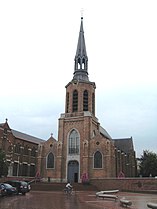|
Beringen, Belgium
Beringen (Dutch pronunciation: [ˈbeːrɪŋə(n)] ⓘ; French: Béringue, French pronunciation: [beʁɛ̃ɡ]; Limburgish: Berringe) is a city and municipality located in the Belgian province of Limburg. The Beringen municipality includes the town of Beringen proper and the old communes of Beverlo, Koersel, and Paal. HistoryOriginsHistorical affiliations
Beringen was already inhabited in Celtic times, as proven by the 1995 archeological finds of gold coins and artifacts on its territory. These date from around 90 BC and are the most northerly late-Iron-Age gold objects found in Europe.[2] Other finds, including of Roman coins, indicate a very early establishment.[3] The first mention of Beringen dates to 1120 when it was known as 'Beringe', a word derived from the Germanic Beringum, which meant 'with the people of Bero'. During Carolingian times, the land of Beringen had been donated to the abbey of Corbie in France.[4] For most of the medieval period, it was part of the County of Loon, from which it received its city charter in 1239. The city was then protected by impressive moats and gated walls. The county of Loon as a whole was annexed to the Prince-Bishopric of Liège in 1366. Beringen became one of the bishopric's 23 bonnes villes (principal cities) and shared its history until its dissolution in 1795.[4] Mining pastUnder André Dumont’s guidance, the first coal-bearing drill cores were obtained in Campine in 1901, leading to several coalmines being established in the region. The first production in Koersel dates from 1919. The golden age of coal production started right after World War II and lasted until the late 1950s, when cheaper energy sources were made available elsewhere. The last coal mine in Beringen closed its doors on October 28, 1989. The remaining slag heaps and mining buildings are still very obvious around the city. Sights
Events
Famous past and present residents
References
External linksWikimedia Commons has media related to Beringen, Belgium.
|
||||||||||||||||||||||||||||||||||||||||||||||||||






